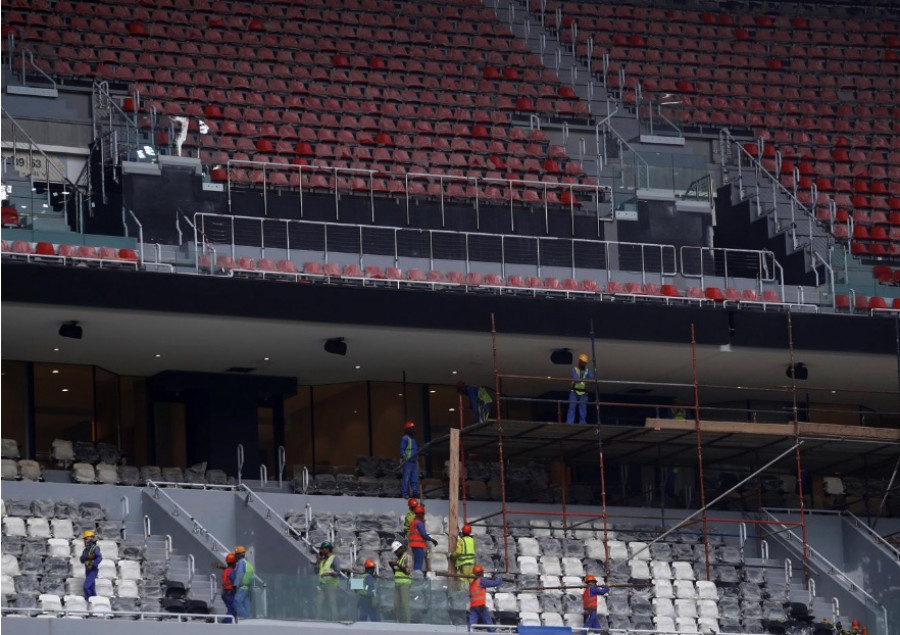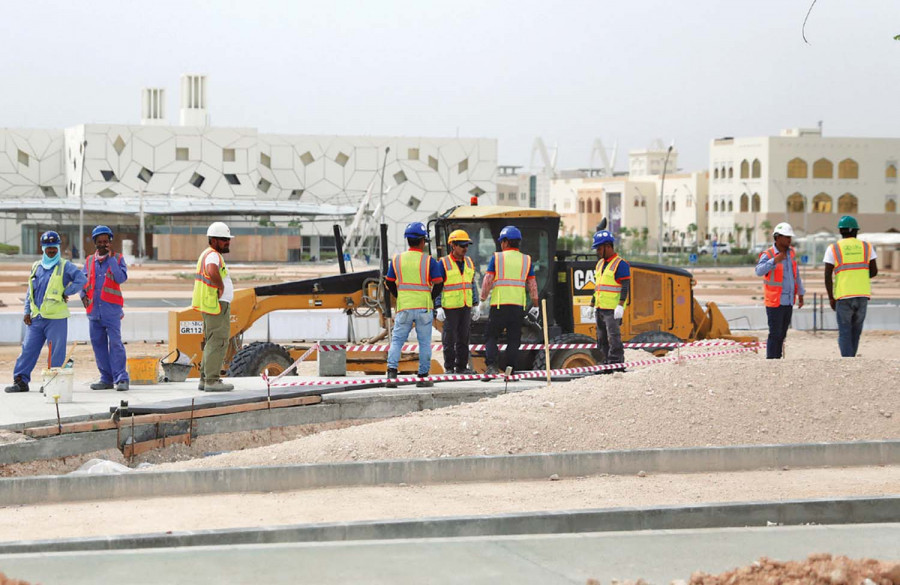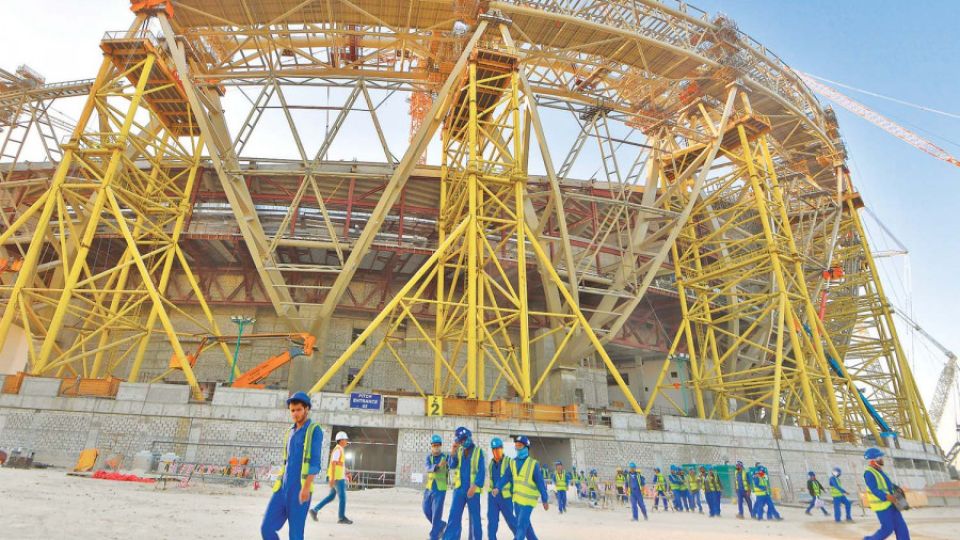October 20, 2022
KATHMANDU – Migrant worker Rup Chandra Rumba died in his sleep in Qatar on June 23, 2019. The 24-year-old from Makwanpur in central Nepal worked on the construction site of one of the stadiums being built for the FIFA World Cup 2022 set to kick off on November 20.
The cause of Rumba’s death was stated as “acute cardiorespiratory failure due to natural causes”, according to the British newspaper The Guardian. His body was brought back to Nepal two weeks after his death.
Hundreds of young and healthy Nepalis have been losing their lives in foreign lands, but no one knows exactly why.
The money sent home by migrant workers like Rumba has crossed the Rs1 trillion mark. The remittance, which is equivalent to nearly one-fourth of the GDP, is crucial for Nepal’s economy.
This money has improved the economic condition of tens of thousands of Nepalis.
Rumba used to send home Rs25,000 to Rs30,000 every month, according to his widow Nirmala Pakhrin, who now lives with her parents in Hetauda.
Since Rumba’s death, his family has been pushed back into financial distress. Pakhrin has been making ends meet by working as a mason or farm hand, whichever job comes her way.
“I earn around Rs5,000 a month,” Pakhrin told the Post over the phone. The income is barely enough to feed her family. She has a 10-year-old son who goes to a local school.
Tens of thousands of Nepali youths like Rumba are compelled to go for foreign employment due to lack of opportunities at home. Many die in faraway lands.
Since 2008-09, more than 11,200 Nepali migrant workers have died, and over 2,200 have been injured in labour destinations, according to the Foreign Employment Board, the government agency responsible for looking after their welfare.
Among them, 1,479 workers lost their lives in the last fiscal year ended mid-July 2022, the highest number of annual recorded deaths so far.
The families of the deceased receive compensation. The immediate family is provided a sum of Rs700,000 through the Foreign Employment Welfare Fund. Workers who sustain serious injuries or become disabled get up to Rs700,000.
However, not all families of the deceased are compensated. Insiders say there are thousands of undocumented Nepalis in foreign lands, and in case of death or injury, their families get nothing.
An investigation by The Guardian last year showed that out of the 6,500 South Asian migrant workers who lost their lives in Qatar in the last decade, as many as 1,641 were from Nepal.
On average, 12 migrant workers from India, Pakistan, Nepal, Bangladesh and Sri Lanka had died every week since December 2010 when Qatar was named the host nation for the FIFA World Cup 2022, the British newspaper had reported.

In this file photo, workers are seen inside Al Bayt stadium built for the upcoming 2022 FIFA World Cup soccer championship, during a stadium tour, in Al Khor, north of Doha, Qatar, December 17, 2019. Reuters
International human rights organisations, migrant rights groups, labour unions and fans around the world have been calling upon FIFA to establish with Qatar a fund equivalent to the World Cup prize money, $440 million, to compensate the migrant workers who built the stadiums and other infrastructure for the football tournament.
“Violation of labour contracts by the employers has been rampant in foreign employment,” said Rameshwar Nepal, executive director of Equidem Research Nepal, a human rights and labour rights research organisation.
Many workers have been paid less than what was agreed in the contract, he said.
Though the employers say they do not charge recruitment fees, it is evident that many workers have been paying a huge sum of money to get foreign jobs.
There are cases of workers being made to work overtime but not being paid extra.
“Rights activists have been demanding that employers in Qatar pay the workers their rightful salaries. This is a temporary initiative where the World Cup is being held,” said Nepal. “The ultimate goal is to make the foreign labour business accountable.”
Neither Qatar nor FIFA has made any commitment regarding the establishment of the fund, according to the Associated Press, but a top FIFA official told European lawmakers last Thursday that the football governing body was positive about compensating workers who sustained injuries while working on World Cup-related projects.
Compensation is “certainly something that we’re interested in progressing”, FIFA deputy secretary general Alasdair Bell told a Council of Europe session on labour rights in Qatar last week.
“It’s important to try to see that anyone who suffered injury as a consequence of working in the World Cup is somehow redressed.”
On Monday, FIFA spokesman Bryan Swanson told a press conference in Doha that the global body was talking with the Qatari government, the UN’s labour agency and international unions. He promised an announcement “in due course”, according to the Agence France-Presse.
“FIFA remains in positive ongoing dialogue with the International Labour Organisation and the International Trade Union Confederation and all relevant authorities in Qatar over initiatives that will benefit migrant workers in Qatar long after the final game of the World Cup,” Swanson said.
International human rights organisations last month said that FIFA’s corporate partners and sponsors of the 2022 World Cup should press the global football association and the Qatari government to provide compensation and other remedies to migrant workers and their families who suffered death or injury, wage theft or debt from illegal recruitment fees.
Human Rights Watch, Amnesty International and FairSquare issued a joint statement after a majority of the 17,500 participants from 15 countries said in a survey that FIFA’s corporate partners and sponsors should publicly call on the top football governing body to compensate migrant workers.
“Though I have shared my story with many news organisations, I have yet to get any compensation from my husband’s employer, the Qatar government or any other organisation,” said Pakhrin.
Labour migration experts and migrant rights activists say the remedy fund is a necessary step and needs to be implemented effectively.
“A compensation fund must be created,” said Ganesh Gurung, a labour migration expert. “Besides death and injuries, migrant workers in Qatar have also been facing contract violation issues as many workers are being sent home before the end of their contract period.”
On August 16, last year, Qatar’s Public Works Authority issued Circular 2021/42 that told companies to complete all construction work by September 21, 2022, and to plan for workers’ leave that reduces the total number of workers in Qatar until January 18, 2023, according to Human Rights Watch.
Gurung said that the Nepal government, in coordination with FIFA, should have proactively worked to establish such a fund which would help the concerned workers. “FIFA should have also taken the initiative to establish the fund and make the employers contribute the most.”

On average, 12 workers from India, Pakistan, Nepal, Bangladesh and Sri Lanka died every week for a decade after Qatar was named the football tournament host. Shutterstock
Government authorities, however, claim they have been raising migrant workers’ issues “strongly”.
“All of these issues fall under ensuring a decent working environment for migrant workers, and we discussed them with Qatar during the latest joint committee meeting,” said Dandu Raj Ghimire, spokesperson for the Ministry of Labour, Employment and Social Security. “The response has been positive.”
According to Ghimire, Nepal will participate in any initiative involving the welfare of migrant workers.
Jeevan Baniya, assistant director at the Centre for Study of Labour and Mobility, Social Science Baha, a non-profit involved in research in the social sciences in Nepal, said compensation would greatly benefit many families who have lost their loved ones while contributing to Qatar’s dream projects.
“It would also establish a precedent for other labour destination countries where migrant workers face similar hardships,” Baniya said.
However, there are questions regarding the clarity of demand for the basket fund and its implementation.
“Though the advocacy for the establishment of such a fund is a positive approach from the perspective of migrant-sending countries, there is no clarity regarding whom Qatar should compensate through the basket fund,” said Baniya.
According to Nepal, executive director of Equidem Research Nepal, what human rights and migrant rights organisations have been seeking is a commitment to remedy the injustices and abuses.
“It is a long process and may require investigations and even the amendment of laws and regulations,” Nepal said. “But right now, we want the authorities to at least commit to establish the fund.”
Amid international pressure, Qatar has set up a workers’ support fund which, since 2020, has paid $164 million in compensation to more than 36,000 workers from 17 countries, Human Rights Watch said in August, citing government data.
The international human rights organisation says the efforts are not enough.
“In recent years, Qatar has introduced a series of important reforms following a forced labour complaint at the International Labour Organisation, and the Supreme Committee for Delivery and Legacy offered better protection for those building stadiums,” said Human Rights Watch.
Nonetheless, serious labour abuses persist across the country, and past abuses have not been adequately remedied.
“The issue requires a bilateral approach for effective implementation,” Baniya added.
“I have lost everything. The financial assistance would definitely help me and my family,” said Pakhrin.


